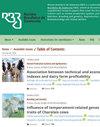饲粮适应前营养管理对耐洛牛瘤胃微生物群的影响
IF 1.2
4区 农林科学
Q3 Agricultural and Biological Sciences
Revista Brasileira De Zootecnia-Brazilian Journal of Animal Science
Pub Date : 2023-08-25
DOI:10.37496/rbz5220210229
引用次数: 0
摘要
本研究的目的是评估在适应高精料日粮之前,限制采食量或补充精料对Nellore牛干物质采食量、瘤胃pH值、细菌和原生动物的影响。实验设计为两个3×3拉丁方格,使用6个空心内洛尔舵机。每个试验期分为预适应期(14 d)、适应期(12 d)和育肥期(7 d) 3个饲喂阶段,每期共33 d。饲喂3种预适应饲粮,分别为对照(随意饲喂蒂夫顿干草+矿物质补充)、限制(以体重的1.4%饲喂蒂夫顿干草+矿物质补充)和浓缩(随意饲喂蒂夫顿干草+体重0.5%的浓缩饲料+矿物质补充)。预试期分为两种预试日粮,精料含量分别为72%和79%,预试期为6 d。精料含量为86%。在预适应阶段,限饲牛的pH值高于精饲牛。无论是限制组还是集中组,牛中埃氏分枝杆菌的相对种群数量都有所减少。在适应期和肥育期,精料组牛琥珀酸梭菌种群数量低于对照组。之前的营养背景会影响适应期和育肥期的瘤胃微生物群,但不会对瘤胃ph产生负面影响。在适应期之前饲喂精料会对向高精料日粮过渡产生积极影响,并促进干物质采食量的增加。本文章由计算机程序翻译,如有差异,请以英文原文为准。
Influence of nutritional management prior to adaptation to a feedlot diet on ruminal microbiota of Nellore cattle
- The objective of this study was to evaluate the effect of either a limited forage intake or concentrate supplementation prior to the adaptation to high-concentrate diets on dry matter intake, ruminal pH, bacteria, and protozoa of Nellore cattle. The experiment was designed as a two 3×3 Latin square, and six cannulated Nellore steers were used. Each experimental period was composed by three feeding phases: pre-adaptation (14 days), adaptation (12 days), and finishing (seven days) diet, in a total of 33 days per period. The steers were assigned to one of three pre-adaptation dietary treatments: control (Tifton hay fed ad libitum + mineral supplement), restriction (Tifton hay fed at 1.4% of BW + mineral supplement), and concentrate (Tifton hay fed ad libitum + 0.5% of BW of a mix of concentrate feedstuffs and mineral supplement). The adaptation period consisted of two adaptation diets, which contained 72 and 79% concentrate for six days each. The finishing diet contained 86% concentrate. During the pre-adaptation phase, restricted cattle had higher pH than concentrate-fed cattle. There was a reduction in M. elsdenii relative population in cattle from either restriction or concentrate groups. During adaptation and finishing phases, cattle from concentrate group had smaller F. succinogenes populations compared with the control group. The previous nutritional backgrounds impact ruminal microbiota during adaptation and finishing phases without causing any negative effect on ruminal pH. Feeding concentrate prior to the adaptation positively impacted the transition to high-concentrate diets and promoted increased dry matter intake.
求助全文
通过发布文献求助,成功后即可免费获取论文全文。
去求助
来源期刊
CiteScore
1.90
自引率
0.00%
发文量
25
审稿时长
8 weeks
期刊介绍:
The Revista Brasileira de Zootecnia (RBZ; Brazilian Journal of Animal Science) encompasses all fields of Animal Science Research. The RBZ publishes original scientific articles in the areas of Aquaculture, Biometeorology and Animal Welfare, Forage Crops and Grasslands, Animal and Forage Plants Breeding and Genetics, Animal Reproduction, Ruminant and Non-Ruminant Nutrition, and Animal Production Systems and Agribusiness.

 求助内容:
求助内容: 应助结果提醒方式:
应助结果提醒方式:


